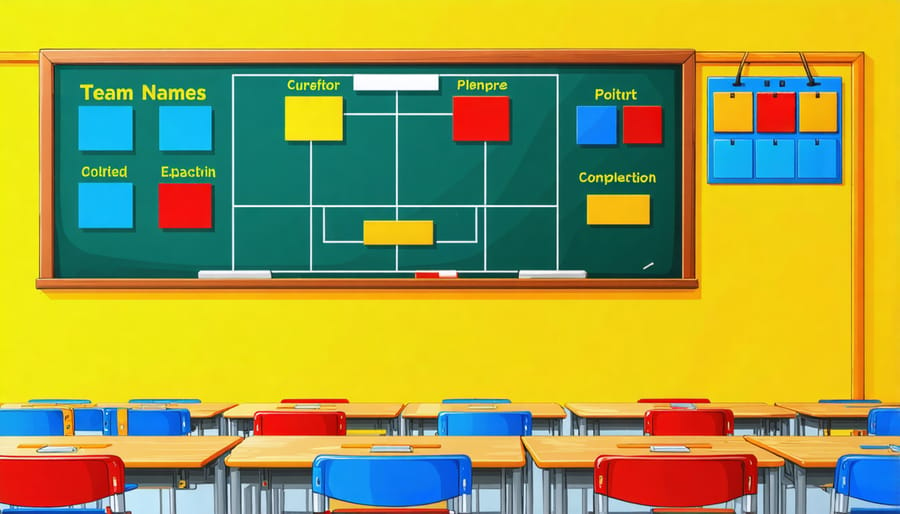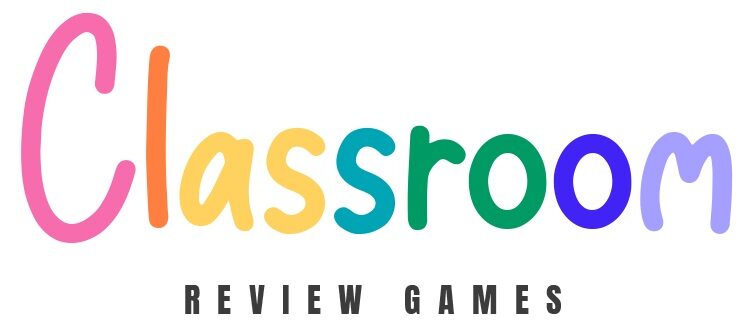These Team Games Make 4th Grade Learning Absolutely Electric
Transform your fourth-grade classroom into an energetic learning hub with engaging team-based learning activities that blend education with excitement. Fourth graders thrive on interactive games that challenge their growing minds while fostering collaboration and subject mastery. Whether you’re teaching math, language arts, or science, incorporating strategic play into your daily lessons keeps students motivated and actively participating. The best part? These classroom games require minimal prep time but deliver maximum educational impact, allowing you to maintain classroom management while watching your students learn through play. From quick vocabulary relays to math fact challenges, these activities seamlessly integrate into your existing curriculum, making learning both memorable and fun for your students.
Quick-Start Team Games (No Props Needed)
Word Chain Champions
Transform your classroom into a word-building battleground with this exciting twist on classic vocabulary building games! Split your students into teams of 4-5 and have them sit in circles. The first player says a word, and the next must say a word that begins with the last letter of the previous word. For example: “cat” → “table” → “elephant.” Set a timer for added excitement! Teams earn points for successful chains and lose points for repeated words or taking too long. Make it educational by focusing on specific subjects – use only science terms, historical figures, or geography words. Keep a scoreboard to track weekly champions and watch vocabulary skills soar while students have a blast!

Math Story Creators
Transform math problems into creative storytelling adventures! Divide students into small groups and challenge them to craft word problems using real-world scenarios. Each group writes a math story incorporating specific operations you’re currently studying, then swaps their stories with other teams to solve. For example, one group might write about planning a class pizza party, including multiplication and division problems for toppings and servings. This activity not only reinforces math concepts but also develops writing skills and creative thinking. Students love seeing their stories come to life while their classmates tackle the mathematical challenges they’ve created. To make it more engaging, encourage teams to include fun characters or use the school environment as their setting.
Silent Line-Up Challenge
Here’s a fantastic way to build teamwork and practice non-verbal communication! Ask your students to line up according to specific criteria (like birth month, height, or alphabetical order) without speaking a word. Students must use gestures, facial expressions, and creative signals to organize themselves. Not only does this activity promote problem-solving skills, but it also creates lots of giggles as kids figure out how to communicate without words.
Make it more challenging by having students line up by shoe size, favorite number, or even the number of siblings they have. When the line is complete, have students take turns showing their answers to verify accuracy. This game works great as a morning energizer or a smooth transition between lessons. Plus, it helps develop spatial awareness and cooperation skills while keeping the classroom noise level down!
Subject-Specific Team Competitions
Geography Explorer Teams
Transform your classroom into an exciting world exploration adventure with Geography Explorer Teams! Split your students into small groups and give each team a world map, atlas, or digital mapping tool. Create fun challenges like “Race Around the World,” where teams plot the fastest route between multiple cities, or “Treasure Hunt,” where they use coordinates to locate hidden landmarks.
Make it extra engaging by having teams earn points for correctly identifying countries, capitals, or geographical features. You can use sticky notes on a wall map for quick-fire rounds where teams take turns placing labels in the right spots. For a tech-savvy twist, try online geography games where teams compete to identify locations on Google Earth.
Add excitement by creating “Geography Detective” cards with clues about different places. Teams work together to solve the mysteries using their maps and geographical knowledge. Keep a classroom leaderboard to track team progress throughout the week, and offer small rewards like extra recess time or classroom privileges to winning teams.
Remember to rotate team members regularly to ensure everyone gets to work with different classmates and share their geographic expertise!
Science Lab Partners
Transform science lessons into exciting collaborative adventures with these partner-based games! Pair students up as “lab partners” and watch their curiosity soar. In “Element Explorers,” partners take turns describing chemical elements using fun clues while their teammate guesses. For “Habitat Heroes,” teams work together to create and present mini-ecosystems using classroom materials, competing to include the most accurate environmental features.
“Science Sleuths” turns partners into investigators who solve mystery cards about various science concepts. One partner reads the clues while the other uses their scientific knowledge to crack the case. Try “Weather Watchers,” where pairs predict weather patterns using simple tools and compare their forecasts with actual weather reports.
Keep the energy high with “Chain Reaction Partners,” where teams design and build simple machines using classroom supplies. Each successful design earns points, encouraging creative problem-solving and teamwork. These activities not only reinforce science concepts but also build important collaboration skills and make learning incredibly fun!
Grammar Games Group
Transform grammar lessons into exciting team competitions with these interactive challenges. Split your class into small groups and play “Parts of Speech Relay,” where students race to categorize words on the board. “Grammar Police” lets teams spot and correct errors in funny sentences, earning points for each catch. “Sentence Building Blocks” encourages groups to create the longest grammatically correct sentence using word cards. For a tech twist, use free online platforms like Kahoot! to create grammar quizzes where teams compete for the highest score. Keep track of points throughout the week and reward the winning team with small prizes or classroom privileges.
Technology-Enhanced Team Activities
PowerPoint Quiz Shows
Transform your PowerPoint presentations into exciting interactive quiz show games that’ll have your fourth graders jumping out of their seats! Create colorful slides with multiple-choice questions, true/false challenges, and picture puzzles covering any subject. Split your class into teams, give them fun team names, and watch the friendly competition unfold!
Make it even more engaging by adding sound effects for correct answers, animated transitions between questions, and a running scoreboard. You can use ready-made templates or design your own themed quizzes for holidays, special events, or specific units you’re teaching.
Pro tip: Let students earn bonus points for explaining their answers to the class. This encourages deeper understanding and helps build confidence in public speaking. To keep everyone involved, include “everybody answers” rounds where each team writes down their response before revealing the correct answer.
Consider rotating team captains daily to give everyone a chance to lead. This simple tech twist on traditional review games is perfect for test prep or introducing new topics while keeping the whole class engaged and excited about learning!
Digital Scavenger Hunts
Transform your classroom into an exciting adventure with digital scavenger hunts! Create engaging online challenges where students work in teams to find specific information, solve puzzles, or complete educational tasks using classroom devices.
Start by designing simple hunts using Google Forms or similar tools. Create clues that lead students to educational websites, videos, or interactive content. For example, teams might need to find three facts about the water cycle, locate specific math problems to solve, or discover historical dates.
Make it more exciting by incorporating QR codes around the classroom that teams can scan to reveal new clues. You can even use free educational platforms like Goose Chase or Deck.toys to create professional-looking hunts with minimal prep time.
To keep things organized, assign team roles like navigator, fact-checker, and recorder. Set clear time limits and rules, and consider offering small prizes or classroom privileges to winning teams. Remember to rotate team members regularly to encourage collaboration among different students.
Best of all, you can easily adapt these hunts to any subject area while building digital literacy skills!

Managing Team Games Successfully
Team Formation Strategies
Creating balanced teams is key to ensuring everyone has fun and participates fully! Try the “counting off” method where students count from 1-4, grouping all the “ones” together, “twos” together, and so on. For a more creative approach, hand out playing cards and group students by suit or number.
To mix up skill levels, use the “line up” strategy: have students line up by height, then split the line into equal sections. This naturally distributes different ability levels across teams. Another fun method is using colored stickers or stamps – students pick them randomly and find their matching team members.
For subject-specific games, consider grouping students based on mixed ability levels. Pair stronger students with those who might need extra support, ensuring each team has a good balance of skills. Remember to rotate teams regularly to help students work with different classmates and build new friendships!

Keeping Score Fairly
Keep score-tracking fun and fair with simple, visual methods that encourage healthy competition. Create a colorful scoreboard using sticky notes or magnets on your whiteboard, where team points are clearly visible to everyone. For quick games, use tally marks or number cards that students can hold up.
Consider using digital tools like ClassDojo or a simple PowerPoint scoreboard for a tech-savvy approach. These tools make tracking points effortless and engaging. To maintain fairness, assign a trusted student as the official scorekeeper or rotate this responsibility among team members.
Remember to celebrate effort alongside points – award bonus points for good sportsmanship, teamwork, or creative thinking. This approach helps maintain a positive classroom atmosphere while keeping students motivated. For longer activities, consider using a weekly leaderboard where teams can track their progress over time, giving everyone a chance to improve and succeed.
Incorporating fun games into your 4th-grade classroom brings countless rewards for both you and your students. These engaging activities not only make learning more enjoyable but also foster essential social skills, critical thinking, and subject mastery. By mixing traditional games with digital options, you can keep students motivated while meeting diverse learning needs. Remember, even simple games can create powerful learning moments – the key is consistency and enthusiasm in implementation. Start small by introducing one or two games weekly, then expand your collection as you see what works best for your class. Your students will look forward to these interactive moments, and you’ll notice improved participation, retention, and classroom community. So go ahead and make learning fun – your fourth graders will thank you for it!

